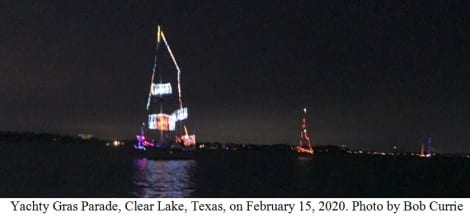 By Bob Currie, Recreational Boating Safety Specialist
By Bob Currie, Recreational Boating Safety Specialist
U. S. Coast Guard Auxiliary Station Galveston Flotilla
As part of its Recreational Boating Safety mission, the Coast Guard often provides regatta patrols, and the Coast Guard Auxiliary often provides those patrols either alone or in conjunction with Coast Guard vessels. Such was the case this past Saturday when I was a crew member on an Auxiliary boat along with Coast Guard small boat CG 29189, a 29-footer from Station Galveston in support of the Clear Lake Yachty Gras regatta.
The Station Galveston Flotilla of the US Coast Guard Auxiliary operates out of the USCG Station Galveston base on Galveston Island. They aid the Coast Guard by providing maritime observation patrols in Galveston Bay; by providing recreational boating vessel safety checks; and by working alongside Coast Guard members in maritime accident investigation, small boat training, providing a safety zone, Aids to Navigation verification, in the galley, and watch standing.
Yachty Gras
Yachty Gras is, of course, a play on the words “Mardi Gras.” Mardi Gras parades are a great seasonal event, and on the Bolivar Peninsula and on Galveston Island there are several parades this time of year. The traditional Mardi Gras parades consist of lavish floats moving slowly down streets lined with people, with float riders throwing traditional Mardi Gras beads and tokens off the float to the people lining the street.

The principle is the same for Yachty Gras, except the floats really are floating, and they pass along the Kemah Boardwalk and docks along the Clear Lake Channel and toss beads to the people along the route. CG 29189 took up a stationary screening position at the far turning point for the participating boats, and we took up a moving screen position between markers 10 and 13. Yachty Gras is considered a powerboat regatta, so the pattern was a long oval, with boats making multiple passes along the boardwalk.
Duties of a Safety Patrol Vessel
The Yachty Gras parade is technically a regatta. A regatta is an organized marine event having to do with racing, water skiing, parading, or demonstrations of skill in navigating. Both participant and spectator vessels are involved. The safety of the participants is the responsibility of the sponsoring organization. Usually the event will be staged over a closed course and patrol sectors will be established alongside and at the end of the course. The size and shape of the course depends on the regatta, and the Yachty Gras course is a very long oval, extending over about a mile in the Clear Lake Channel.
There are two ways in which patrol vessels are used: either as a marker vessel or a screen vessel. Marker vessels are positioned at designated places, either stationary or mobile, to mark limits of restricted areas. Screen vessels may be either stationary screen vessels or moving screen vessels. These vessels move in position around the perimeter of the course in order to be continually between the participant vessels and spectator vessels. While CG 29189 took up a position as a stationary screen vessel at the outer loop at the entrance to the bay, our Auxiliary vessel, along with the Kemah police boat, sheriff’s office boat, and the game warden’s boat, took positions as moving screen vessels.
Running Interference
Spectator or transient vessels often have a difficult time determining if an event is in progress or whether it is just a group of vessels enjoying an outing. These vessels presume that if the navigation rules are adhered to, they can proceed between the participant vessels. The patrol vessels must exercise skill, knowledge, tact and courtesy to prevent this interference from happening.
The participant vessels were quite easy to distinguish from most of the spectators just by observing their decorative lighting. However, boats in the Clear Lake area are often well-lit with decorative lighting, so the regatta sponsors provided the participants with large numbers which were attached to each side of the participant vessels near the bow. If we spotted a non-participant attempting to enter the parade, we simply positioned our patrol boat between the interloper and the parade. Since we had our flashing lights operating, the non-participant vessels understood that they were to stand off.
Marine Safety Information Bulletins
As with any special event, it is important to let the Coast Guard know about the event, even if you do not request Coast Guard support. The Coast Guard will then announce a Marine Safety Information Bulletin on Channel 16 and instruct listeners to go to Channel 22A to hear the bulletin. We will make the announcement every 30 minutes during the time the event is scheduled and 30 minutes prior to the beginning. We will also repeat the bulletin for a period of time after the event in case there are stragglers.
Summary
Boat races and parades, known as regattas, are special events which qualify in most cases for U.S. Coast Guard official support. Most large organized events such as the Yachty Gras Parade apply well in advance for Coast Guard support. This support usually comes in the form of Coast Guard and Coast Guard Auxiliary patrol boats. Use of the Coast Guard can make for a much safer event and we are glad to provide the service.
For more information on boating safety, please visit the Official Website of the U.S. Coast Guard’s Boating Safety Division at www.uscgboating.org. Questions about the US Coast Guard Auxiliary or our free Vessel Safety Check program may be directed to me at [email protected]. I am available to perform free Vessel Safety Checks, and I will come to your location to perform them. SAFE BOATING!
[Feb-17-2020]

 Posted in
Posted in 
























